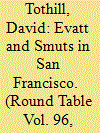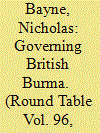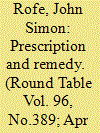|
|
|
Sort Order |
|
|
|
Items / Page
|
|
|
|
|
|
|
| Srl | Item |
| 1 |
ID:
077783


|
|
|
|
|
| Publication |
2007.
|
| Summary/Abstract |
On 5 December 2006 Commodore Frank Bainimarama, head of the Republic of Fiji Military Forces, staged Fiji's fourth coup since its first in May 1987. The flashpoint came after a long drawn out confrontation between the military, overwhelmingly indigenous Fijian, against a predominantly Fijian-led government of Prime Minister Laisenia Qarase. The military accused the government of breach of faith and of giving succour to politicians who had been variously implicated in the George Speight-led coup of 2000, rewarding them with ministerial portfolios. The introduction of controversial bills, promising amnesty to coup convicts, and the government's curious unwillingness to take the military's threats seriously, compounded the problem. The coup deposed a democratically elected government but it also in the process dealt a severe blow to the influence of some of the most important institutions of Fijian society. A military-appointed interim administration, with Bainimarama as prime minister and Labour leader and former coup victim Mahendra Chaudhry as finance minister, has been installed and has promised to hold Fiji's next general elections in 2010
|
|
|
|
|
|
|
|
|
|
|
|
|
|
|
|
| 2 |
ID:
077785


|
|
|
|
|
| Publication |
2007.
|
| Summary/Abstract |
This article compares the Australian H. V. Evatt and the South African J. C. Smuts as their countries' foreign ministers at the time when the United Nations Charter was drafted. It shows that Smuts, long considered a statesman of international stature, was less adept at the game of international politics UN-style than Evatt, a relative neophyte on the world stage
|
|
|
|
|
|
|
|
|
|
|
|
|
|
|
|
| 3 |
ID:
077782


|
|
|
|
|
| Publication |
2007.
|
| Summary/Abstract |
My grandfather, Charles Bayne, spent his career in the Indian Civil Service administering Burma from 1880 to 1906. He and three colleagues - Edward Symes, Donald Smeaton and Herbert Thirkell White - filled the key posts in the central Burmese administration for two decades. He assisted Sir Charles Crosthwaite (Chief Commissioner 1887 - 90) in pacifying the province after the third Burmese war. Through the calmer 1890s he was responsible for economic policies, especially rice cultivation and teak forests. But the quartet broke up in the 1900s: Symes committed suicide; Smeaton fell out with Lord Curzon; Bayne, after two breakdowns, retired early; only White survived, to end his career as Lieutenant Governor. Burma's experience 100 years ago has parallels with the occupation of Iraq and the advance of globalization. The British annexed Upper Burma before deciding its future. The colonial administration was orderly, but inhibited the growth of locally based, democratic government, with consequences still seen today. Burma under British rule grew rich from the export of rice and teak (and later oil), but this wealth went mainly to expatriates, not local Burmese cultivators. The resentment this caused later brought a reversion to inward-looking economic policies
|
|
|
|
|
|
|
|
|
|
|
|
|
|
|
|
| 4 |
ID:
077784


|
|
|
|
|
| Publication |
2007.
|
| Summary/Abstract |
The aim of this article is to consider the approach to, and solution adopted by, Lord Lothian, British Ambassador to Washington, to what President Roosevelt referred to at the end of January 1940 as a "minor crisis" in Anglo-American relations. His prescription reflected a long held Atlanticist belief that saw cooperation between the USA and Great Britain as a guarantor of security, a carefully managed profile, and an understanding of American public opinion. The ambassador's remedy to the 'minor crisis' over US perceptions of British abuse of neutral rights meant utilizing personable relationships with key figures in Washington and explaining British policy in straightforward terms. Crucially also for the resolution of the minor crisis, Lothian was able to articulate that importance of American opinion to those making British foreign policy in London. That his views were heeded in London is testament to his efforts and the pertinence of his prescription, which saw him become the pre-eminent conduit in Anglo-American relations during the first half of 1940
|
|
|
|
|
|
|
|
|
|
|
|
|
|
|
|
|
|
|
|
|